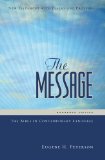The Message: New Testament with Psalms and Proverbs. By Eugene H. Peterson. Colorado Springs: NavPress, 1995. Pp. 940. Paper, $17.00.
All Scripture quotations in this publication [review] are from THE MESSAGE. Copyright © 1993, 1994, 1995. Used by permission of NavPress Publishing Group.
The author—I feel “translator” would be a misnomer—says that the NT was written in “street language—not a refined language that appeals to our aspirations after the best but a rough and earthy language that reveals God’s presence and action where we least expect it” (p. 9). The Rev. Peterson’s goal is “to convert the tone, the rhythm, the events, the ideas, into the way we actually think and speak” (italics added).
As a Bible translator and editor myself, I must disagree. Yes, God did use the koinē or common Greek dialect of the first century. However, it was written by men whose minds were saturated with the truth and beauty of the OT Scriptures. Also, who would say that the Sermon on the Mount, the Upper Room Discourse, Romans 8, First Corinthians 13, the Book of Hebrews, or Revelation 5—to choose a few famous texts—are in “street language”?
Since I have personally been vilified in print for my work on the NKJV as (among other things) a communist, a “practical atheist,” and a “fundamentalist apostate,” I don’t wish to impugn the motives of the Presbyterian minister who wrote this book. I believe he wants to reach the masses, and so uses colorful, racy, and slang-peppered language. A Christian friend who works in prison ministries asked me to “check out” Hebrews, since she felt parts were, to use her word, “blasphemous.” That’s going too far, but the samples I have chosen, I think, will illustrate that this book is often inaccurate, overly idiosyncratic, and even irreverent in places.
Regarding inaccuracy: “They ditch their parents when they get in the way” seems pretty strong for “disobedient to parents,” p. 362, first full paragraph. (No verse numbers exist in the text, so it’s hard to find things.)
The aorist passive participle in Rom 5:1 (“being,” or better “having been justified by faith”) turns out “what God has always wanted to do for us—set us right with Him…” (italics added). This reviewer says: It’s done!
I have read that Peterson is a poet. Here is how he begins his Psalter:
How well God must like you—
you don’t hang out at Sin Saloon,
you don’t slink along Dead-End Road,
you don’t go to Smart-Mouth College (p. 648, top).
I believe neither the human nor the Divine author of Ps 1:1 would claim this as inspired poetry or God’s message.
As to idiosyncratic, the “one-man” motif really shows in The Message. A penchant for racy, slangy lingo (often colorful and communicating, granted), is everywhere. From Romans 1, p. 362, top: “godless and loveless wretches” [the “gays”], “all hell broke loose,” “mean-spirited, venomous, fork-tongued God-bashers! Stupid, slimy…they’re spitting in God’s face.”
As to irreverent (bordering on vulgar in my opinion) Proverbs 30, pp. 936, bottom and 937, top:
Here’s how a prostitute operates:
she has sex with her client,
Takes a bath,
then asks, “Who’s next?”FOUR INTOLERABLES
Three things are too much for even the earth to bear,
yes, four things shake its foundations—
when the janitor becomes the boss,
when a fool gets rich,
when a whore is voted “woman of the year,”
when a “girlfriend” replaces a faithful wife.
More appropriately, here’s a sample of our Lord’s condemnation of the Pharisees:
“Instead of giving you God’s law as food and drink by which you can banquet on God, they package it in bundles of rules, loading you down like pack animals. They seem to take pleasure in watching you stagger under these loads, and wouldn’t think of lifting a finger to help. Their lives are perpetual fashion shows, embroidered prayer shawls one day and flowery prayers the next. They love to sit at the head table at church dinners, basking in the most prominent positions, preening in the radiance of public flattery, receiving honorary degrees, and getting called ‘Doctor’ and ‘Reverend’” (Matthew 23, p. 69, middle).
This is creative and vivid, and since no doctrine is at stake, probably acceptable to most believers.
But is it right to read back into the text (not just to put into sermons, which all preachers do!) “church dinners” before there was a church (pre-Pentecost) and “honorary degrees” and “Reverend” in the first century?
The constituency of JOTGES cares especially about clear Gospel verses. Peterson’s Eph 2:8 (p. 478, top) largely gets high marks: “Saving is all his idea, and all his work. All we do is trust him enough to let him do it. It’s God’s gift from start to finish! We don’t play the major role. If we did, we’d probably go around bragging that we’d done the whole thing! No, we neither make nor save ourselves. God does both the making and saving.”
However, what does the writer (not the apostle Paul!) mean by “we don’t play the major role” (italics added)?
John 3:16 fares not as well: “This is how much God loved the world: He gave his Son, his one and only Son. And this is why: so that no one need be destroyed; by believing in him, anyone can have a whole and lastinglife” (italics added).
“Eternal life” (Greek and most translations) and “a whole and lasting life” (The Message, p. 225) sound like the difference between theology and psychology!
John 5:24, a classic grace verse, reads: “It’s urgent that you listen carefully to this: Anyone here who believes what I am saying right now and aligns himself with the Father, who has in fact put me in charge, has at this very moment the real, lasting life and is no longer condemned to be an outsider.” Unfortunately, the next line reads “this person has taken a giant step from the world of the dead to the world of the living” (pp. 231-32, italics added).
On the streets of Yonkers and Washington, D. C., one “giant step” wouldn’t get us kids “home” in the sidewalk game of “Giant Steps.”
Acts 16:31 is a great Gospel of grace text which has helped garner numberless converts into the fold. I don’t think The Message’s spin on this is even near the mark: “He led them out of the jail and asked, ‘Sirs, what do I have to do to be saved, to really live?’ They said, ‘Put your entire trust in the Master Jesus. Then you’ll live as you were meant to live—and everyone in your house included!’” (p. 325, middle, italics added).
Another feature that conservatives will not like is that Lord and LORD are changed to God and GOD, as in the Inclusivist Bible reviewed above.
I predict The Message will sell very well and be much praised by the avant garde and by those not familiar with or deeply concerned about the original or of standard versions such as the KJV, NKJV, NASB, or NIV. I also fear The Message is not close enough to the original to be called the Word of God.
Arthur L. Farstad
Editor
Journal of the Grace Evangelical Society
Dallas, TX


